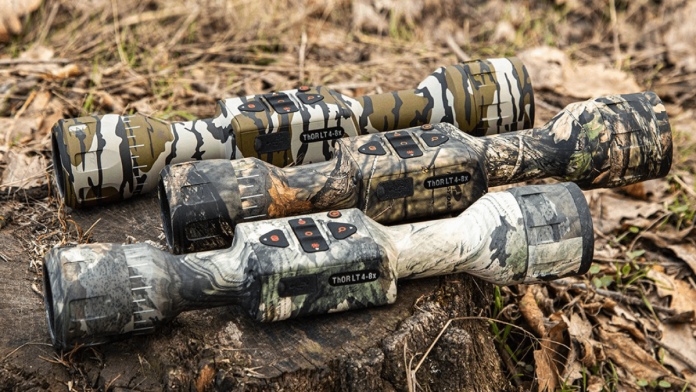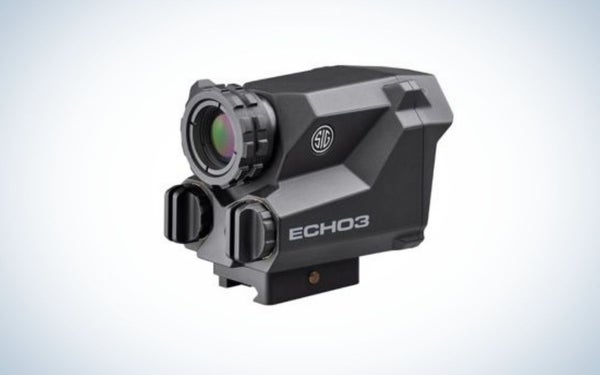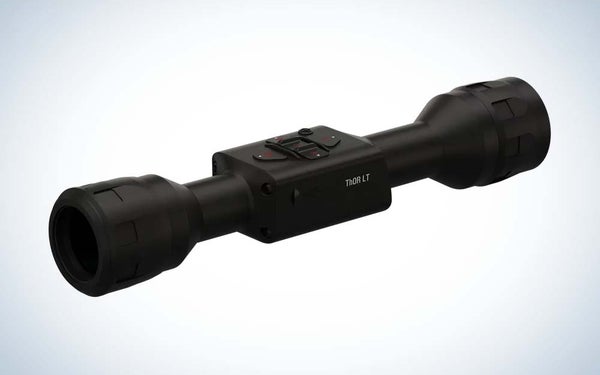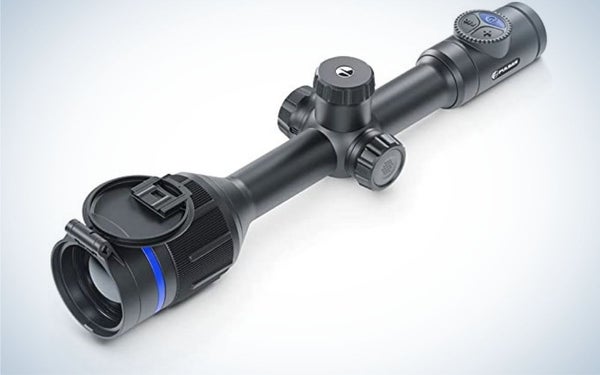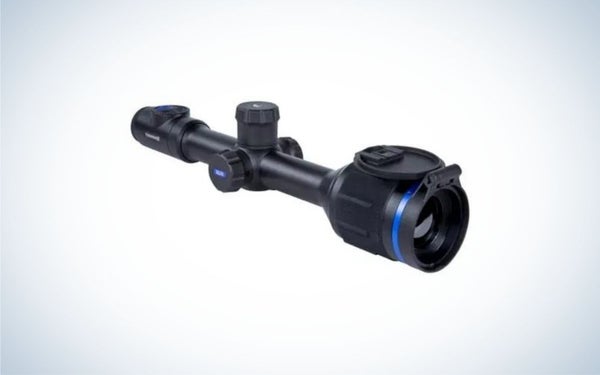We may earn revenue from the products available on this page and participate in affiliate programs. Learn more ›
Updated Apr 13, 2023 6:52 AM
The technology behind thermal scopes used to be prohibitively expensive. This made them available only to those with deep pockets and big budgets, including the military and larger law enforcement agencies. But with all the advancements in technology, the price point of thermal imaging scopes has dropped significantly, and they have become more available than ever.
The increased availability of thermal scopes has led to a surge in popularity for nocturnal hunting pursuits like hog and coyote. In turn, this increased consumer demand has spurred dozens of companies to enter the market and make thermal scopes available to a larger group of hunters and shooters than ever before. Whether you’re looking to get your first or upgrade to a more advanced model, we’ll show you some of the best thermal scopes so that you, too, can get in on the action.
How We Picked The Best Thermal Scopes
Buying a thermal scope is a serious investment. As we’ve seen, there are a lot of options to choose from, and none of them can really be considered cheap. That’s why it’s important to really consider the various aspects of thermal scopes. Some criteria are more important than others. When it comes down to picking the right one, I evaluate products using the following standards:
Image Quality: What kind of technology is in this scope and how does that impact the image quality? Will I be able to get an adequate sight picture that will allow me to use this scope as intended?
Going the Distance: How far out can this thermal scope pick up a heat signature? More importantly, how accurate is the signature at that distance? When you’re reaching out to 1,500+ yards, it’s very important to know exactly what animal you’ve got in your sights.
Cost: Are the features and benefits of this thermal scope in line with the price? It’s kind of a given that a thermal scope is going to cost some serious coin, but are the features there to justify a specific price?
The Best Thermal Scopes: Reviews & Recommendations
Best Overall: Sig Sauer ECHO3
Specs
- Eight color palettes and 6 brightness settings
- Can capture videos and photos
- Equipped with Bluetooth and WiFi
Pros
- 6+ hours of battery life even with heavy use
- Available with 6x or 12x zoom
- Customizable reticles
Cons
- Not as many bells and whistles as some of the other options
For the person who wants a cheap thermal scope that has a great range of options but doesn’t cost upwards of $5,000, the Sig Sauer ECHO3 is a great option. In fact, there are two versions are available, they’re almost identical except that one has 6x zoom and the other has 12x zoom. The one with 6x can be had for less than $3,000, making it a bargain.
Both ECHO3 models have fantastic battery life so that you won’t run out of power while you’re out in the field. With eight color palettes and six brightness settings, you can adjust the image to fit any need, day or night. Turn on the recoil activation for the video and camera and capture unique stills and footage from your hunts. The Bluetooth and WiFi connectivity give even more options to customize your reticles and pair the scope with data from the Sig Sauer KILO Rangefinder.
Best Budget: ATN Thor LT 160
Specs
- 10+ hours of battery life
- Available in black or 3 camo patterns
- Includes a variety of accessories
Pros
- 1280×720 HD display
- Built-in one-shot zero feature
- Multiple display options
Cons
- Less magnification than other models
It’s hard to find a good thermal scope for under a grand, but the ATN Thor LT 160 manages to do it – just barely – with a price of $999. For a beginner thermal scope, this is a solid option. The 1280×720 HD display and 3x-6x magnification are perfect for most applications, and the ability to choose between white hot and black hot displays allow you to pick what works best for you and your scenario.
With a battery life of 10 hours, you definitely won’t run out if you go into the field fully charged. Having just dropped a cool grand on a new scope, your ammo budget might feel a little pinched, so the Thor LT 160 has a built-in one-shot zero to help save you some ammo. Since gun owners often like to coordinate their guns and accessories, you can get the ATN Thor LT 160 in black or three different Mossy Oak camo patterns.
Best Long Range: Pulsar Thermion 2 XP50
Specs
- Picture-in-picture reticle options
- IPX7 waterproof rating
- All-metal housing
Pros
- Full-color display with multiple palettes
- Can withstand recoil up to .375 H&H rifles and 12-gauge shotguns
- Detection range of 2,000 yards in complete darkness
Cons
- Spare batteries are $80+
- Learning curve for all the features may be steep for some
Pulsar has done quite well in the thermal scope game in recent years, and the Thermion 2 XP50 is proof that they’ve got the formula down. At $4,999, though, we’re just squeaking it in under the $5,000-mark. This scope has tons of bells and whistles and is made with the best materials to provide a stunning final product. Multiple color palettes combined with Pulsar’s proprietary Image Boost technology and a full-color AMOLED display means that you’ll get the best picture quality possible on targets all the way out to 2,000 yards.
Speaking of the picture, there’s even a picture-in-picture option to give you a zoomed image within your regular sight picture. You can also use the internal memory to record and store hours of video and thousands of photos. WiFi connectivity lets you use a smartphone or tablet as a second display, so others can look on as well. It’ll stand up to rough use too, built to withstand the punishing recoil created by rifles chambered up to .375 H&H and 12-gauge shotguns.
Best Clip-On: Trijicon SNIPE-IR Thermal Clip-On Scope
Specs
- Waterproof
- No-shot zero function
- Multi-directional thumb stick menu control
Pros
- Designed to work with the ACOG or other 4x day sights
- Power saver mode to help extend battery life
- Multiple display options
Cons
- The price tag puts it out of reach for most people
Trijicon is known for their top-notch optics, and the SNIPE-IR Thermal Clip-On Scope is no exception. You need to look no further than the $9,999 price to know that this is a cream-of-the-crop piece of equipment. That said, if you need a rock-solid design that has been battle-tested to exacting military standards, then this scope is for you. Trijicon uses the highest-grade materials possible, and it shows.
While this is a clip-on thermal scope so that you can easily remove it during the day, you can seamlessly run this scope with your regular day optic even if it features magnification up to 4x, and even 6x with certain optics. The 640×480 OLED display and 60HZ frame rate provide a clear picture with very little lag for use in high-speed applications, such as tracking running game or fast-moving targets. You can choose from three levels of white hot and three levels of black hot to get your desired sight picture.
Best for Rifles: Pulsar Talion XQ38
Specs
- Ambidextrous top-mounted controls
- Accurate out to 1,475 yards
- Three sensitivity amplification levels
Pros
- Save up to 5 different shooting profiles with up to 10 different zeros each
- 10 reticle options in 9 color profiles
- Variable 2.5-10x zoom
Cons
- Price tag may be out of reach for some people
The Pulsar Talion XQ38 thermal scope is lightweight yet mighty. Built from a magnesium alloy, it can withstand usage on rifles up to .375 H&H and 12-gauge shotguns. With nine hours of battery life, you’ll have no worries about running out of power when on the hunt. The Talion’s thermal sensor is very powerful, picking up heat signatures out to 1,475 yards in total darkness. With a 2.5-10x variable zoom, you can focus right in on those long-range targets and take them down with ease.
Pulsar designed this scope with rifles in mind, outfitting it with a prism mounting system that lets you easily shift the scope during installation to obtain precise mounting with little to no frustration when you need to adjust it. While most thermal scopes have the controls located on one side or the other of the body, the Talion XQ38’s controls are top-mounted for easy navigation whether you’re right- or left-handed.
What to Consider When Choosing a Thermal Scope
I’m sure you’ve figured it out already that the best thermal scopes aren’t cheap. Most people aren’t going to go out and drop a sizable chunk of change on a thermal scope on a whim. There are some things that you should seriously consider first and decide what thermal scope is right for you. (Or, honestly, if you even actually need one, or if that money is better spent elsewhere.)
If you look online, you can find companies that offer thermal scope rentals. This is a great way to try out different models and get a feel for what you like best before committing to a purchase.
Obviously, the final decision is up to you, but if you decide that your next big gun-related purchase is going to be a thermal scope, then here are some of the things you should think about before parting with your hard-earned money:
Battery Life
There’s a lot of technology packed into a thermal scope, and it’s got to have some kind of battery to power it. Not all batteries are created equal, and so you want to be sure that your thermal scope will stay powered up for as long as you need it. This means you’ll want to consider how long you plan to be using the scope in a single session, how long does it take to charge, and how much do spare batteries cost.
Magnification
How much magnification a thermal imaging scope has is very important when choosing the right one for your needs. The higher the magnification, the further you can see, making it better for long range shooting. On the other hand, lower magnification allows for a wider field of view. Note, too, that higher magnification can lower the resolution (the quality of your image).
Extra Features
Some thermal scopes offer WiFi, GPS, Bluetooth, and more. These are all really cool features to have, but you have to consider what you’ll be using your thermal scope for and whether or not those extra features are worth it or not. For example, do you really need to be able to stream your scope picture to a mobile device?
Price
This is going to be a recurring theme in this piece. Thermal scopes aren’t inexpensive, and the best thermal scopes are even more costly. In general, you’re going to get what you pay for. However, that doesn’t mean that there aren’t some very good options on the market at every price point. Just be aware that with great technology comes great cost, and even the budget options are rather pricey.
If you don’t think a thermal scope is right for you, you can check out our roundup for the best traditional budget scopes and rimfire scopes as well. You can also take a look at our picks for the best gear of the year.
FAQs
Q: Can I use a thermal scope in daylight?
Yes, you can absolutely use a thermal scope in daylight. This is one big advantage to using a thermal scope over more traditional night vision devices, which cannot be used in daylight. Additionally, you can use a thermal scope to spot game at greater distances because you can pick up their heat signature even if you might not be able to see them in a more traditional sense. You can even use a thermal scope in conjunction with your regular day optic, which is something that cannot be done with night vision.
Q: How much do thermal scopes cost?
The cost of a thermal scope varies widely, but none of them are what most people would consider to be cheap. You can find some under the $1,000 price point, but those are rare to find. And if you’ve only got a grand in the budget, you’d be better served to save up a bit more. Most thermal scopes on the market will cost at least $2,000 and some even cost more than $5,000. Models that come in at $10,000 are not out of the question.
Q: How do thermal scopes work?
Thermal scopes are optical devices that measure heat radiation, which essentially causes the object to glow under infrared or thermal imaging. The unaided human eye cannot see on this light spectrum, which is why we need optical aids for better sight at night. Thermal imaging technology allows the human eye to see this particular spectrum of light that we cannot normally see, making it much easier to see things that are giving off heat even in very low or no light conditions. (You can also watch this video for a more in-depth explanation.)
Q: How long do thermal scopes last?
A good thermal scope should last for thousands of hours of use. Of course, its life span will depend on how well you treat and care for it, and how much of a beating it takes while you’re out hunting. You should keep it in a case to protect it and store it out of direct sunlight or heat, as you would with any optics.
Q: Can a thermal scope see through trees?
While a thermal scope can’t see through the trunk or branches of a tree—after all, it doesn’t have X-ray vision powers—it can detect heat in forested and heavily wooded areas that helps animals (or people) stand out among the vegetation.
Final Thoughts on the Best Thermal Scopes
Thermal scope technology has come a long way in a short period of time. All the bells and whistles that you can get on various models is quite staggering. Of course, the more features you have, the more expensive the unit will be. When you’re dealing with such high-end technology that comes at a high price even for entry-level units, it’s important to really take a long and hard look at how you intend to use your thermal scope. Few hunters and shooters will really ever need a thermal scope that costs $10,000 or more. For most of us, an entry-level or mid-level one will be more than enough to satisfy both the novelty of thermal shooting and the necessity of it, most likely in terms of population control for hogs and other such animals.
Why Trust Us
For more than 125 years, Field & Stream has been providing readers with honest and authentic coverage of outdoor gear. Our writers and editors eat, sleep, and breathe the outdoors, and that passion comes through in our product reviews. You can count on F&S to keep you up to date on the best new gear. And when we write about a product—whether it’s a bass lure or a backpack—we cover the good and the bad, so you know exactly what to expect before you decide to make a purchase.

